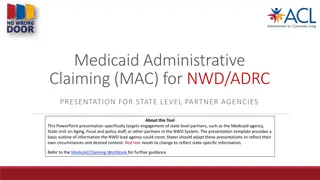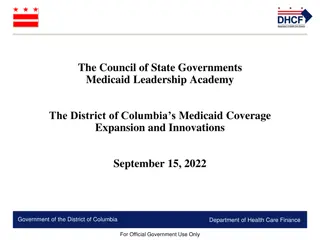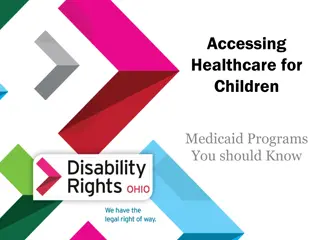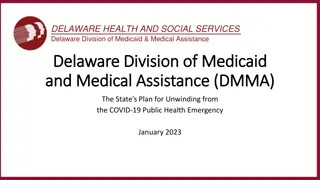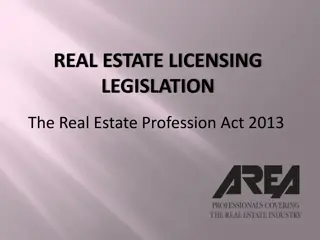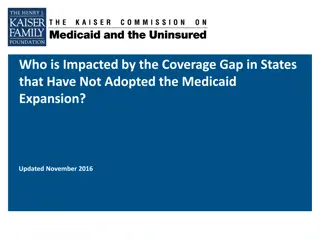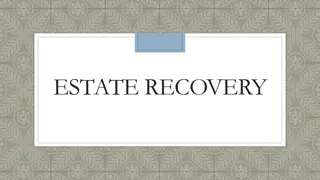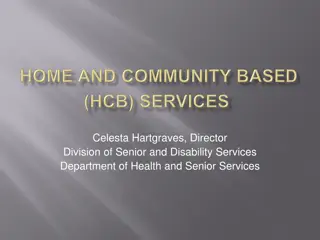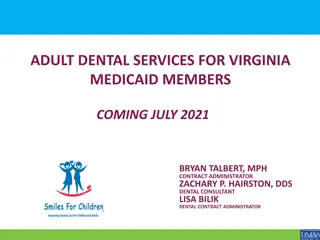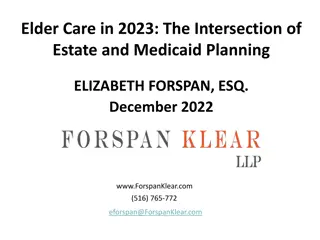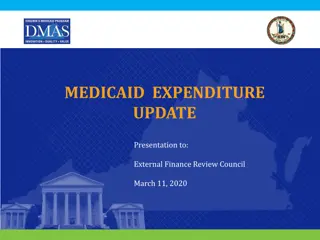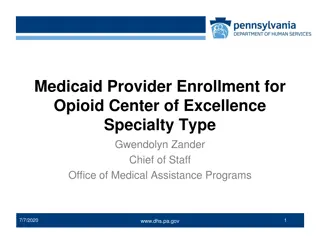Medicaid for Estate Planners Overview
A detailed guide on Medicaid for estate planners, covering qualification requirements, program overview, long-term care options, and income criteria for eligibility. Learn how Medicaid differs from Medicare and how individuals can qualify based on specific needs and financial situations.
Download Presentation

Please find below an Image/Link to download the presentation.
The content on the website is provided AS IS for your information and personal use only. It may not be sold, licensed, or shared on other websites without obtaining consent from the author.If you encounter any issues during the download, it is possible that the publisher has removed the file from their server.
You are allowed to download the files provided on this website for personal or commercial use, subject to the condition that they are used lawfully. All files are the property of their respective owners.
The content on the website is provided AS IS for your information and personal use only. It may not be sold, licensed, or shared on other websites without obtaining consent from the author.
E N D
Presentation Transcript
Medicaid for Estate Planners By: Elizabeth Wallace, AGILE Elder Law 509-530-2380 liz@agilelawfirmeast.com
Program Overview State and Federal Program Long-Term Care Requirements for Qualification Medical Financial Income Resources Single person Married couple What do you need to know as Estate Planners?
What is Medicaid? A state and federal program that provides medical and long-term care benefits for people who meet a means tested standard. Medicare is a federal program that pays for medical and hospital care for persons over 65 who pay a monthly premium. Medicare will not pay for long-term care. Medicaid does pay for long-term care for aged, blind, and disabled persons who meet the requirements for the program. A Medicaid recipient pays most of their income toward the cost of their care and the State pays for the difference each month. Generally, a recipient keeps less than $80 per month for all their needs not covered by Medicaid.
Long-Term Care Long-term care costs can vary widely but are very expensive from $3,000 per month to $14,000 per month in most cases. Medicaid will pay for long-term care. Long-term care means care provided to a person who needs assistance with the normal activities of daily living. This care can be provided in different settings: Skilled nursing facility/hospital/institutional Adult family home/assisted living facility/memory care facility At home
How does one qualify? - Physical Activities of daily living: Eating Bathing Toileting Transitioning Ambulating Transferring Positioning Medication Management Need help with two ADLs OR Significant cognitive impairment and need help with one ADL
How does one qualify? - Income In a skilled nursing facility: Income must be less than private rate plus regular monthly medical costs In an assisted living facility or adult family home: Income must be less than $7,618 (this can be increased) Income must be less than $2,349 for Community First Choice At home: Single person, must be less than the cost of in-home care and less than $783 to qualify for Community First Choice Married person, must be less than the cost of in-home care and less than $1,183 to qualify for Community First Choice
How does one qualify? - Assets SINGLE PERSON $2,000.00, plus: Home, with equity up to $595,000.00 Vehicle, used to transport person to and from appointments Pre-paid burial plan and plot Life insurance with face value less than $1,500.00 (aggregate) Personal property and household goods
How does one qualify? - Assets MARRIED COUPLE SINGLE ASSETS PLUS: Any amount of equity in the home, if spouse lives there Community Spouse Resource Allowance: Currently $58,075.00 Up to $128,640.00, if in a skilled nursing facility If the couple has more than $60,075 when entering the facility, then they may keep one-half of their total assets up to $130,640 when qualifying for Medicaid
How does one qualify? - Assets OTHER NON-COUNTABLE RESOURCES: A longterm care partnership insurance policy Assets jointly-owned with someone who refuses to sell those assets Assets which cannot be converted into cash within 20 days, for as long as the applicant is making a reasonable effort to sell them A Medicaid-compliant annuity (SPIA): Irrevocable Non-assignable Single Premium Pays out in equal monthly installments which begin immediately 5 years or life expectancy of the annuitant The State is the first remainder beneficiary (or after disabled or minor child)
Transferring Assets What happens? Some clients may ask about giving away assets to their children while they are alive. Do not have them do this unless it is part of a Medicaid plan for the future. If an applicant has transferred assets for less than fair market value in the five years before application, DSHS evaluates that transfer to determine if a penalty should be applied. Assets transferred more than five years prior to application do not carry a transfer penalty. Medicaid will not pay for care during a penalty period.
Transfers which do not incur a penalty Transfers between spouses Transfers to disabled children or minor children (house) Transfers to a trust for the sole benefit of a disabled person under age 65 Transfers that have been fully returned to the applicant Transfers that were intended to be for full market value Transfers of exempt resources other than a home Transfer of a home to: A caregiver child A sibling with an equity interest in the home who has lived there at least one year
Penalty Period Hardship Waiver If DSHS imposes a penalty period for the transfer of assets, an applicant can request a hardship waiver of that penalty period. In order to grant that waiver, DSHS must verify that: The applicant has exhausted all reasonable means to recover the assets. If the assets were transferred by the recipient, there was evidence of undue influence or fraud. If the waiver is not granted, the applicant s life or health will be in danger. *If the waiver is granted, DSHS may fine the gift recipients for up to 150% of the amount spent by DSHS for care during the penalty period.
Transfers to Self-Settled Trusts Transfers to self-settled trusts for the benefit of a disabled person under age 65 are not penalized. d4A trusts are self-settled trusts for disabled persons under age 65 and are created by the beneficiary, beneficiary s parents, guardian, or a court. No transfers may be made to these trusts after age 65. d4c trusts are pooled trusts for disabled persons of any age. However, transfers to such a trust by a Medicaid applicant or recipient who is over age 65 will still carry a transfer penalty.
Third Party Trusts If a third party (including the estate of a spouse) transfers assets to a trust for the benefit of the Medicaid applicant, those assets are not counted unless the applicant has the right to direct where those assets are used or if the trust has language directing the trustee to pay for the health and welfare of the beneficiary. These trusts can be funded by a living person or by an estate. This is the reason for using spousal supplemental needs trusts. If created by a will, the assets in that trust are non-countable.
Testamentary Trusts Married Couples In general, a living trust that contains the assets of either spouse is going to be an available asset to the applicant. A supplemental or special needs trust for the benefit of the applicant will be an available asset to the applicant if it was created by a living trust that contained assets of either spouse. A supplemental or special needs trust for the benefit of the applicant (surviving spouse) created by the will of the deceased spouse is not an available asset to the applicant in most cases. Estate planning for couples in Washington should always include consideration of a spousal protection trust in both wills.
Estate Recovery When the State pays for care for a person after age 55, it is entitled to estate recovery after that person s death. The State can lien on and recover from any assets owned by the Medicaid recipient at the time of that person s death. The State cannot recover from assets owned by that person s spouse or from a home in which a surviving spouse, disabled child, or minor child still resides. In some cases when a person is in a skilled nursing facility and unable to return home, the State can file a TEFRA lien while the person is still alive. The State must remove the lien immediately if the person is discharged from the nursing facility or otherwise returns home.
What do estate planners need to know? The single best thing you can do for your clients to avoid Medicaid problems in the future is good estate planning now. Spouses in Washington should not have a revocable living trust unless they have enough assets to ensure they will never need Medicaid. Any client who is leaving assets to a spouse or other loved one should consider a supplemental needs trust for their will. Spouses should almost always have one. Powers of Attorney should be very thorough. The longer people live, the more often we rely on an attorney-in-fact as a decision maker and Medicaid planner.
Supplemental Needs Trusts Supplemental needs trusts can be created and funded by a will or a living trust. Supplemental needs trusts which benefit a surviving spouse must be created by a WILL to be effective for protecting assets. Any clients who are leaving assets of some value to another person should have at least a contingent supplemental needs trust in their will. Anything can happen and any beneficiary can become someone who needs care later. These trusts can be used to protect assets from unintentional disinheritance and divorce, spendthrift beneficiaries, and creditors in addition to the State.
Powers of Attorney When Medicaid planning is done on behalf of the principal by an attorney-in-fact, many strategies require certain language be present in the Power of Attorney. Some examples are: The power to gift assets not in keeping with estate planning documents. The power to make gifts in order to qualify for Medicaid and avoid estate recovery. The power to gift assets to the Attorney-in-Fact. The power to create or revoke a community property or separate property agreement.
Final Thoughts Always plan like your client could need long-term care later. If possible, put these elements into place now, even if your clients are young. Persons of any age can lose capacity and not be able to change things at a later date. If you have questions, ask an elder law attorney.





